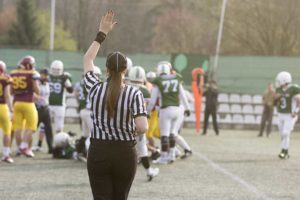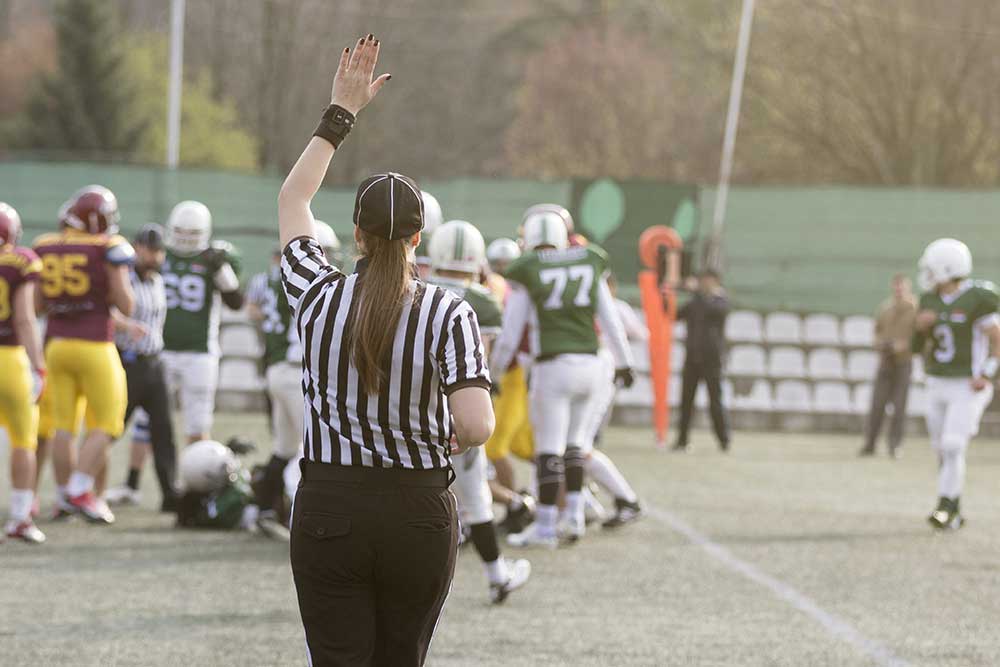Disclaimer: The information on our website is provided for general information purposes only. We make no representations or warranties of any kind, express or implied, about the completeness, accuracy, reliability, suitability or availability with respect to the website or the information contained on our website for any purpose. Any reliance on such information is therefore strictly at your own risk and we are not liable for any damages or losses arising out of or resulting from your reliance on any information contained on our website.
Umpires, referees, and other sports officials preside over sporting or athletic events that are competitive in nature in order to maintain the fairness and standards of an event or competition. They must have a thorough knowledge of the game and its rules in order to enforce the fair play of the game or impending penalties that may apply.
Watch a video to learn what a referee does:
How to Become a Referee, Umpire, and Other Sports Official

A high school diploma and training is usually required to become a referee, umpire, or sport officiant. Every state has its own requirements and some sporting association even have guidelines that must be followed. Training sessions or seminars are held before, during, and after the season so everyone remains familiar with any rule changes, improve their officiating, and evaluate their current knowledge of the sporting or event regulations.
Some work for high school athletic programs and usually are required to be registered with the state or other local agency that oversees athletics for educational settings. It is common for umpires and referees to be required to take and pass an exam once they have been trained to ensure efficiency and ethical practice.
Job Description of a Referee, Umpire, and Other Sports Official
Umpires, referees and sports officials officiate at competitions, sporting events, and other games. This means he or she is responsible for judging performances of the competitors to determine who has won an event. Officials must inspect all equipment for safety and compliance as well as make sure the participants are safe to play. They need to keep watch over start and stop times, call attention to infractions when necessary, and regulate play.
All sports officials must be prepared to settle disputes by participants and enforce any penalties according to the rules of the game. He or she is expected to be able to anticipate a play, therefore, place themselves into the best position to observe and judge a play. In the case of a sporting event that calls for more than one umpire or referee, one must be able to give the correct signals in their area of play concerning fouls or other rules of the game to other sporting officials. This is considered to be a highly stressful occupation because of the requirement and ability to make split-second and sometimes, unpopular decisions, and rulings.
Most sporting officials work part-time and work irregular hours. Weekends, evenings, and holidays are often required in addition to traveling to various sporting complexes or events. This can be local, in the state that they reside in, or across the country. They work indoors and outdoors pending on the sport or event that are working at.
Sports Official Career Video Transcript
Professional and amateur sporting events require impartial officiating to make sure all the rules are followed. Umpires, referees, and other sporting officials keep a close eye on the game to keep all play fair. The responsibilities vary depending on the sport. Before game-time, these officials may inspect the grounds and equipment and even examine players. They check that safety and event regulations are observed and that eligibility requirements have been met.
Once the action starts, they may keep track of time, scores, and stats. They often serve as judges. You need a sharp eye and the ability to focus intently on the action while tuning out the distractions all around. Be prepared to be out in all sorts of weather, often at night, weekends, and holidays. Umpires and referees detect infractions of the rules, often stopping the action to call the problem and assess appropriate penalties on the spot. This can cause some heated arguments. Umpires, referees, and other sports officials may serve groups ranging from community leagues to school or college athletics departments to professional teams.
This can be a high-stress job. You must be able to make quick decisions. 20/20 vision and quick reflexes are important. A cool head and a strong command of the rulebook are essential. Getting a job in sports is rarely a slam-dunk. The field is so popular that competition is fierce. Most jobs in this field are part-time and entry-level salaries tend to below. While there is no education requirement to enter the field, pursuing more training and professional certifications can help you get ahead of the pack. And when you do, you’ll have the best seat in the house!
Article Citations
Bureau of Labor Statistics, U.S. Department of Labor, Occupational Outlook Handbook, Umpires, Referees, and Other Sports Officials.
National Center for O*NET Development. 27-2023.00. O*NET OnLine.
The career video is in the public domain from the U. S. Department of Labor, Employment and Training Administration.

